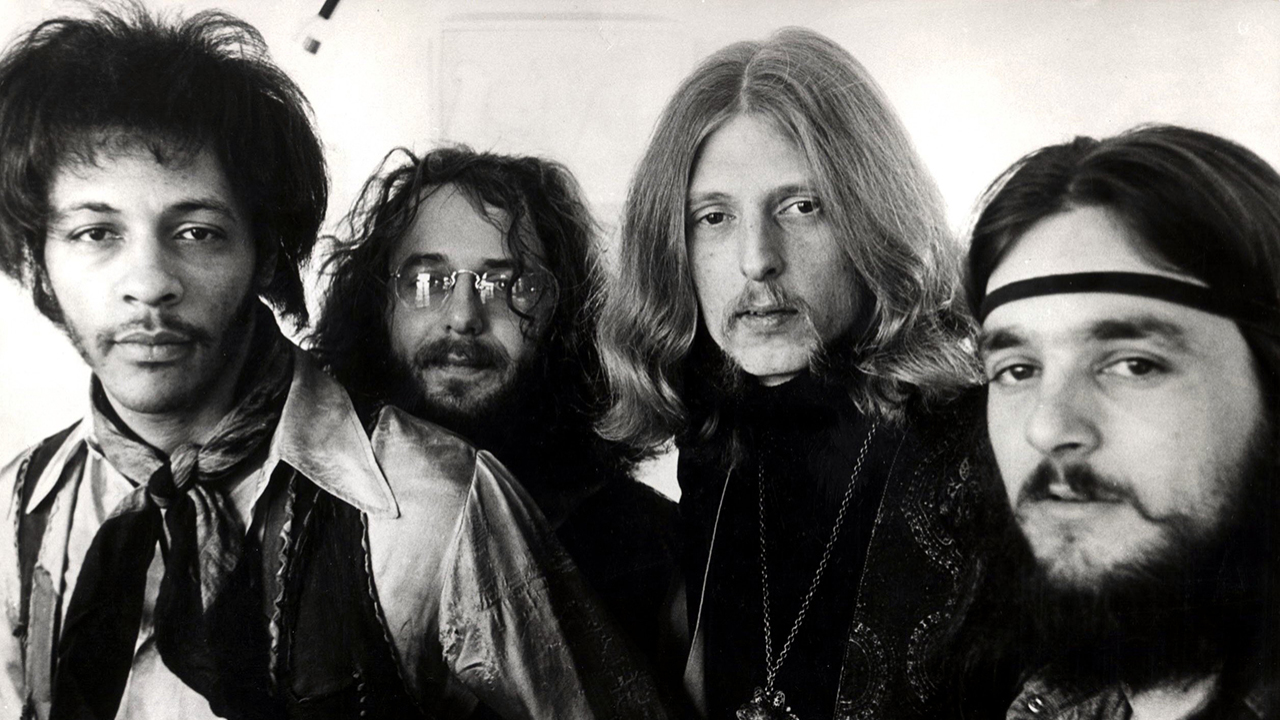Our 66 from ‘66, H-L.
Jimi Hendrix
Hey Joe
Polydor single, December 16, 1966
Hendrix’s arrival in London in September 1966 sent shockwaves through the capital’s musical community. Like some left-handed guitar-playing James Bond, women wanted to be with him, and men – especially Eric Clapton – wanted to be him. The culmination of this summer of madness was Hendrix’s debut single. Hey Joe was a murder ballad, previously recorded by US folkie Tim Rose. The story of a man who shoots his ‘cheatin’ ol’ lady’ and flees to Mexico was blunter than anything by supposed bad boys The Who or the Rolling Stones. But initially Hey Joe, with its gospel backing vocal ‘oohs’ and ‘aahs’, pottered along like a regular pop song. Then, around the 1:27 mark, Mitch Mitchell’s busy drumming and Hendrix’s increasingly fervent vocals and stun-gun guitar took it somewhere new. Hey Joe is an exercise in menace and understatement; every slow-burn hard rock song of the 1970s and beyond squeezed into three-and-a-half peerless minutes.
The Incredible String Band
The incredible String Band
Elektra, June 1966
Before they became avatars of acid-folk, ISB recorded this sublime debut that served to loosen British folk from its traditional constraints. Or at least free it from the tap rooms and cellars of its prime habitat. It was the band’s only album to feature the original trio of Clive Palmer, Robin Williamson and Mike Heron, each member favouring their own guitar-led songs over traditional material, framed by delicate touches of mandolin and banjo. The result was a minimalist masterpiece. Dylan declared himself a fan (singling out Williamson’s October Song for special praise), and Robert Plant would later cite ISB as a major influence.
Skip James
Today
Vanguard, March, 1966
The oldest artist to appear in this round-up, Nehemiah Curtis ‘Skip’ James was a Delta blues guitarist/songwriter, who was rediscovered in the mid-60s by John Fahey and Canned Heat’s Henry Vestine and Al Wilson, who found Skip dossing in a Mississippi hospital and suffering from the DTs.
Vanguard Records put Skip into their New York studio and taped him in full flight on the depression-era Hard Time Killing Floor Blues, as well as cheerier pieces My Gal and I’m So Glad. A huge influence on Canned Heat (James was the model for Wilson’s high vocal style) his music was a welcome antidote to the more familiar Howlin’ Wolf and Muddy Waters.
Bert Jansch
Jack Orion
Transatlantic, September 1966
Scottish-born Jansch recorded this, his third album, for Transatlantic (the British equivalent
of Elektra) with his friend John Renbourn adding guitar, while producer Bill Leader ran the machine and rolled the joints on what might be construed as a dry run for Pentangle. Key moments included The First Time Ever I Saw Your Face and Jansch’s ornate banjo picking on The Waggoner’s Lad. Taken on its own, Jack Orion was a remarkable example of fluid British guitar genius, but when placed in context it made a huge impact on Jimmy Page, Nick Drake, Donovan and Jethro Tull. Led Zeppelin adapted Blackwaterside as Black Mountain Side on their debut using the Jansch/Anne Briggs arrangement and didn’t even say thank you.
Jefferson Airplane
Takes Off
RCA, August 15, 1966
Before Grace Slick, Jefferson Airplane had Signe Toly Anderson who had a startling contralto and sang while pregnant. Blessed with psychedelic godfathers Marty Balin and Paul Kantner, the band also included Skip Spence and future Hot Tuna wizards Jack Casady and Jorma Kaukonen. Heavy acid users like their friends in the Grateful Dead, the Airplane caught the counterculture mood with the barely disguised trippery of Run Around, the sexually charged Let Me In and the archetypal hippie anthem Let’s Get Together, written by Quicksilver Messenger Service’s Chester Powers. Forebears of the acid revolution, the band blended intricate vocals alongside Kaukonen’s guitar solos. Crawdaddy! magazine hailed Takes Off as the “most important album of American rock” that year.
Love
Love
Elektra, March 1966
Da Capo
Elektra, November 1966
They could have been called Hate, given the insidious menace of their prettiest melodies. Love’s deftest songs captured the sunshine essence of the Summer Of Love while offering portends of 1969 and all that. Their debut showcased their schizoid tendencies, ranging from guitarist Bryan MacLean’s delicate Softly To Me to mainman Arthur Lee’s stark drug addict’s lament Signed D.C. The gentle foreboding of Mushroom Clouds anticipated the apocalyptic thunder of the second album’s 7 And 7 Is. Both albums opened with some Burt Bacharach worship. But Love’s My Little Red Book swapped the suave fury of the original for punky venom, while Stephanie Knows Who was practically a rewrite of What’s New Pussycat?.
On Da Capo they upped the florid ante with Orange Skies and She Comes In Colors. Revelation was a side-long blues jam with shades of Goin’ Home from the Rolling Stones’ recently released Aftermath. The real revelation was that Love, prophets without the commercial honour they deserved, had already been performing it live for a year.
